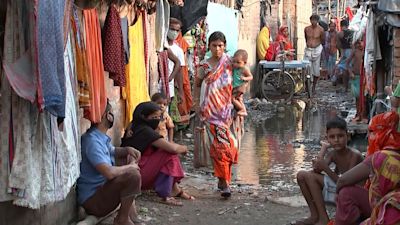Covid: 'At no point did we back a decision to compromise national health', India's ruling BJP says

ITV News Correspondent Juliet Bremner reports from India on how the vaccination programme is ignoring some of the poorest people in the country
Kolkata is a city with thousands of slums and millions of people in need of kindness and support, where Mother Teresa devoted her life to helping the poor.
Around a third of the population here, more than 1.5 million people, live in these shanty towns with flimsy homes, open sewers and no running water.
Life in the slums is always tough and in a pandemic it just becomes harder.
As India struggles to recover from a crippling second wave of coronavirus, fuelled by a more infectious new variant, the government is being accused of failing to prepare and leaving its vast population exposed as it struggles to meet vaccination targets.
At the current rate, close to 11 million a week are being vaccinated but unless that increases dramatically it is predicted that it will take until 2024 to cover the entire adult population.
The pandemic has made life in the slums even harder
Nowhere is this more apparent than the slums of Kolkata where we went to talk to families about the difficulties of accessing Covid jabs.
In one slum built close to the port, which has grown up around the main sewer outlet, we learned that just a handful of the 5,000 people who live here have had a vaccination.
We watched as pigs swam and foraged in the black contaminated water that surrounds the makeshift homes, but community leader Serajul Karim is anxious to let us know that despite the cramped living conditions, they had managed to avoid widespread illness and death.
He puts this down to the unhygienic surroundings which he believes helps people to build strong immune systems. But he is nevertheless anxious that they can get their jabs to stop the spread of the virus and at the moment there is no prospect of this happening.
A quick survey of those crowded around the camera confirmed that no-one had yet received one.
The first problem is that you need to book a jab on the government’s CoWin website. To do this you must have a computer or smart phone.
In the slums they have phones but the majority of women and older people are illiterate and unable to use the site.
Soni Khatoon, an 18-year-old who speaks some English, showed us how difficult it would be for her mother who is 40 and has no education.
"It is not just my mum. There are many women who cannot use a smart phone or register, which is a big problem," she told us.
The second hurdle is lack of supply. The vaccination centre closest to the port slum had a queue of people over the age of 45 waiting for the second dose.
Coronavirus: What You Need To Know - listen to the podcast
But the prime minister has opened jabs to everyone over the age of 18 and there are no doses for this massive slice of the population.
The clinic manager explained that they had not received any new vaccine for first doses for almost three weeks - the last batch arrived on April 28 - and they had been instructed by the city health authority to give only second doses.
Despite India being dubbed "the pharmacy of the world" because it produces large quantities of drugs, it has ended up with a shortage of vaccines to inoculate its own population of 1.4 billion.
It will take us longer to vaccinate everyone in India because we have a larger population, National Vice President of the BJP, Jay Panda tells ITV News
This is partly because millions of doses of Astra Zeneca (or Covishield as it is called in India) were sold abroad or donated to poorer countries earlier this year when the Indian government wrongly assumed it had defeated the virus.
Even the ruling party, the BJP, accept it will take time to accelerate and complete the embattled vaccination programme.
They blame a shortage of raw materials from abroad to make the vaccines rather than the government’s own failure to place orders at an earlier date.
The National Vice President of the BJP, Jay Panda, rejected the idea that they had put the economy before the safety of the people.
'At no point did we back a decision to compromise national health,' Jay Panda tells me
He accepted they currently have a short term supply problem but boldly predicts that everyone will be vaccinated before the end of the year.
He said: "We expect to be reaching somewhere like 10 million a day by the end of June. It will be several weeks before we reach the speed which is ideal and several months before we can reach the level of vaccinations required."
It is not a prediction they recognise or accept in Kolkata’s slums, where people expect to wait for years rather than months to get protection.
Ashraf Ali, from Right Track, one of the NGO’s working in the poorest districts, told us he expected it would be years before everyone was vaccinated. "It will take a long time possibly 2022 or 2023 - yes a long time," he sighed.
Watch the full interview with National Vice President of the BJP, Jay Panda, on our YouTube channel here.